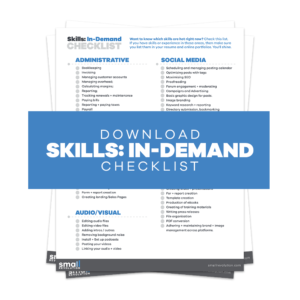Full-time and part-time editor jobs are both demanding. That’s why it’s essential to understand your career goals and the type of position you want to pursue before applying for an editor job.
Both positions can be rewarding, provided you find one that fits your skillset, personality, and interests.
Below, we compare the two in-depth to help you find the ideal choice for you.
Option 1: Full-Time Editor Jobs

Working as a full-time editor is an option some freelance editors choose, but is it for you? Let’s weigh the pros and cons.
Pros of Full-Time Editor Jobs
Working full-time as an editor has many advantages, especially if the work is steady and you’re relatively new in the field.
Excellent job stability. A full-time editor job offers excellent job stability. You enjoy consistent payment and know how much you earn and when.
Getting paid the same amount monthly or weekly enables you to effectively budget for long-term and short-term expenses. Additionally, you can plan your savings and address any unexpected costs that may arise.
As a highly-skilled editor, you’ll enjoy job security since many employers will go to any lengths to keep you. This security translates into a relaxed and healthy working environment, increasing productivity.
Career development. As a full-time editor, you can attain higher professional levels by improving your skills.
For example, you can get promoted to a higher position if your company sees you as a long-term investment. The promotion may come with rewards such as higher incomes and job satisfaction.
A full-time editor’s job allows you to develop your career through training, mentorship and networking events, and professional conferences and workshops.
By spending most of your time editing various projects, you gain more experience and expertise. This allows you to grow professionally and scale your career to higher levels.

Cons of Full-Time Editor Jobs
Below are the downsides of full-time editing jobs.
Burnouts. Burnout is a prevalent problem among full-time editors. When you work on the same project every day, you lose inspiration, making it easy to lose motivation as an editor.
High editorial job demands and work stress may also result in physical, mental, and emotional exhaustion.
Long working hours. Beating deadlines for editorial tasks can be a challenge, especially when dealing with large projects such as books. You’ll have to work for long hours, including nights and weekends, to ensure you submit the work on time.
Working long hours can lead to fatigue, stress, sleep deprivation, and repetitive strain.
Option 2: Part-Time Editing Jobs

Part-time editor jobs help you establish connections with potential employers while earning you extra income. This can be a fun and profitable way to spend your free time while strengthening your chances of success in editing.
Is working part-time as an editor always a bed of roses? Here are the pros and cons of part-time editor jobs.
Pros of Part-Time Editor Jobs
The pros of a part-time gig include:
More flexibility. Part-time editor jobs offer flexibility. You get to pursue your passion while supplementing your income.
As a part-time editor, you set your working hours and choose which projects to work on based on how much time you can spare. You also get to choose the clients you work for.
You don’t work for long hours, so you have extra time to attend to your schoolwork, take care of your family, or work at another job for more income.
Cons of Part-Time Editor Jobs
Let’s see the weaknesses of part-time editor jobs.
Lack of job security. The most significant disadvantage of part-time editing is the lack of job security. You don’t know how long you’ll work on a particular job, making it difficult to plan your future.
Less pay. Part-time editor jobs pay way less than what you can earn as a full-time editor. Even if you manage to acquire good editing skills, they may not be as valuable as they would in a regular editing position.
Fewer opportunities to advance your skills. Working as a part-time editor comes with fewer opportunities to advance your skills because you aren’t full-time staff.
You also don’t work in the same place as your boss or coworkers. When you work in an office, every day is different. There are always new opportunities and challenges to benefit from as a full-time editor.
For example, as a part-time editor, you’re likely to miss out on mentorship programs and other career benefits common in an office environment.
Full-Time vs. Part-Time Editor Jobs Salary
Editors’ salaries vary depending on:
- Experience
- Location
- Type of publications
Below is a table showing editors’ salaries by percentile, according to Zippia.
| Percentile | Annual Salary | Monthly Salary | Hourly Salary |
| 90th | $81,000 | $6,750 | $39 |
| 75th | $66,000 | $5,500 | $32 |
| Average | $52,535 | $47,378 | $25 |
| 25th | $41,000 | $3,417 | $20 |
| 10th | $33,000 | $2,750 | $16 |
Which One Is Best for You?
Overall, both full-time and part-time editor jobs have their advantages.
A full-time job is best for those who want to pursue editing as a career. The stability, benefits, higher salary, and long-term potential of full-time jobs make this choice attractive to many in the field.
A part-time editor job, on the other hand, is best for those who want to use their free time to supplement their income.
Visit Small Revolution to learn more about editor jobs and determine which option is best for you.
Here’s what Thea, one of our graduates, had to say about us:
Thanks a lot for your help. I have now been hired by FilterBuy and will be starting to work very soon. I am very excited and I can’t wait to work with them.
Thea, Small Revolution graduate
Frequently Asked Questions
Can I become an editor without a degree?
Yes. You don’t need a degree to become a freelance copy editor. However, you must have a high command of grammar, spelling, and punctuation.
Is being an editor worth it?
Indeed. Editors are free to make their own decisions and work with minimal supervision. Editors who work remotely can do so from the comfort of their homes and choose their clients.
What can editors be promoted to?
Based on experience, editors can be promoted to senior editor, associate editor, and deputy editor positions. The highest-ranking role within the editorial team is the chief editor.
Share on Facebook:



